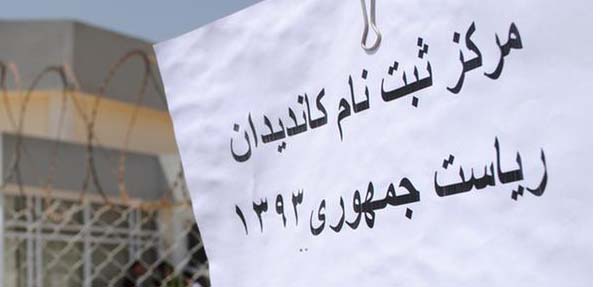The latest developments in the election process are indicative of both challenges ahead of the forthcoming elections and opportunities for leading a fair and transparent process.
In the last couple of weeks, the Independent Election Commission (IEC) has been very busy to thoroughly vet the election candidates, particularly presidential hopefuls along with their running mates. Based on the timeframe announced by the Independent Election Commission (IEC), the preliminary list of the candidates was expected to emerge on Saturday, October 19. However, the IEC officials delayed the announcement until coming Tuesday, saying that they – along with the Ministry of Foreign Affairs – need more time to review dual-nationality of the candidates.
The delay in announcement of the preliminary list of the election candidates on Saturday and the whole conduct of the process brought criticisms from the election-monitoring civil organizations. Whatever the effects of the delay might be on the schedules of different stages of the elections, the criticisms directed to the election bodies highlight some genuine and real challenges in the IEC’s conduct of the vetting process and the criterion for candidates as stipulated by the election laws. One of the main issues in the vetting process, which also caused the delay in announcement of the preliminary list of the candidates, is the dual-nationality of the candidates. The election laws bar those who hold citizenships of another country along with Afghan citizenship from running in the elections.
According to unconfirmed reports, many of the registered candidates are excluded from the preliminary list including some high-profile candidates. If this is the case, there is a high chance that some of these candidates might be barred due to their dual nationalities. However, officials have suggested that there are also names that are excluded from the process because of their failure to provide sufficient election documents or to meet other requirements of the process. The election bodies may find it a difficult task to decide on the issue of dual-citizenship, as the issue is very complicated and controversial and involves some high-profile candidates. However, this time the law is clear and specific on the issue and bars those who have dual citizenships.
Even though, there are concerns that election candidates and their supporters may seek to influence the election bodies and their commissioners. The IEC and ECC must deal with pre-election issues such as assessing candidates’ eligibility regarding the dual/single nationality, links to illegal armed groups, human rights abuses and legal convictions. And because of this, many of the candidates may attempt to influence the Independent Election Commission. The election bodies are also susceptible to being influenced in favor of some specific candidates, specifically those who are thought to be endorsed by the government camp, or at least are believed to be backed by the government camp and the President.
Therefore, it is crucially important that the Electoral Complaints Commission preserves their independence and act fairly in both the initial vetting process and during the next phases of the elections. The ECC should be empowered and also taken accountable by the parliament and the civil organizations to do its monitoring job efficiently for running a fair and transparent process. The IEC and ECC cannot ignore the fact that there would be a sound election only if the election bodies resist to attempts to influence them. If the election complaints body proves its effectiveness in this stage of the election, it would strengthen its status in the wake of the presidential elections with the job to examine complaints regarding to the election process and decide on the transparency of the whole process.
Another issue that has been highlighted these days is the conduct of the election bodies in disqualifying the candidates. IEC officials had warned that any candidate with links to illegal militant groups or the insurgent groups will automatically be disqualified from the process. In an attempt to assure of their election conduct, the electoral officials also said that those with criminal records will be barred from running in the presidential and provincial councils’ elections. However, the questions were always in place whether the IEC and ECC are in the position to run the process efficiently and based on the law.
According to the reports, many of the candidates are disqualified in the initial stages of the process; however, the reasons are yet to be known for public. It is unclear to what extent the election bodies are determined to carry out the power and authority they have in their jurisdiction to disqualify candidates, in case if they are found connected with human rights abuses and war crimes. The scope and nature of the vetting process and the criterion the election bodies impose on the candidates will profoundly affect the outcome of the preliminary list and the final contesters. And the question remains whether the election bodies are able to use their legal authority and power to carry out the vetting process as stipulated in the law.
In reaction to the delay in announcement of the preliminary list of candidates, a number of civil organizations, which are monitoring the election process, expressed concerns on the delay as well as absence of independent monitors to oversee the vetting process. There are concerns that the crucial vetting process may be influenced by certain candidates and other stakeholders or it may be concluded in a questionable and unfair manner with no transparency. Despite that the IEC has announced it would consider the complaints against the candidates publicly, as stated by the law, absence of independent monitors and civil organizations from the ongoing vetting process may affect the transparency of the process in a way or another that could also lead to controversies.

